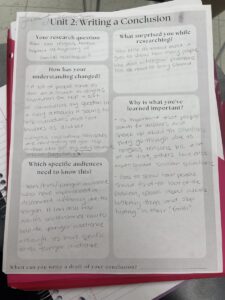Author: Leslie De La Cruz (Page 3 of 7)
Source:
McQuade, Ryan. “Ethel Cain and the Haunting of Religious Trauma.” National Catholic Reporter The Independent News Source, 26 Aug. 2023.
In this news article, I got to learn a little more about Ethel Cain and her musical album “Preacher’s Daughter” which I briefly mentioned before. As I read this article I got more in-depth knowledge of what this album consists of. The author McQuade provides the reader with background information about Ethel Cain and how at 16 she left the church but being brought up in a religious household held her back in different ways although she was finally “free” (1). By breaking apart this album it gives the reader a better understanding of how Ethel Cain evolved and how her religious trauma essentially caused her death. Toward the end of her album, she is stuck and can’t seem to stay away from men who symbolize her abusive preacher father. Ethel falls in love with those who don’t reciprocate that feeling and by doing so she falls in love with her killer who ends up cannibalizing her.
R&R analysis:
As I was learning about “Preacher’s Daughter” I felt like this news article really went into detail about what this album itself represents. I can see how religion impacted the decisions made by Ethel Cain and how it ended up harming her. She had firsthand help at the church she was brought up in by being a preachers daughter but it didn’t quite go that way, instead her father would abuse her and setting an example to her by making her think that she is only capable of receiving that treatment by significant others as well. It really shows how bad things can happen even in the “presence of God” that’s where I feel there is irony. This is where a lot of religious institutions fail those who seek help because all the bad is essentially internalized and never shown to the outside world leaving those who left look like liars and keep that lingering feeling of guilt. I really loved the description of how in many ways that religious trauma that a person carries can develop into more serious things if they don’t seek help or speak up. That is also a different point where mental health is often rarely looked at or cared for in a religious institution, they say prayer can fix everything but can it really?
Quotables:
“When I moved out, I was like, ‘Oh, I’m free, ‘I’m out of the church, out of the South, I’m gone, I’m a free woman, a free bird,’ ” she said… And I realized that the aftershock, the lingering effects of Christianity, were not going to be easily dealt with and forgotten.”
“There are sacraments for the penitent, retreats for the lost, but where are the services for those who need to scream at the top of their lungs? Where can you confess that the trauma has turned to dreams; dreams of burning down a church or smashing a statue or running away or cursing the Divine? Where do the blasphemers go on Sunday?”
“The fictional Ethel Cain, after years of abuse by her preacher father, runs away. Her buried trauma takes the form of men: men she will fall in love with, men who will abuse her and a man who will ultimately kill and cannibalize her.”
Source:
Oppelland, Dorothea. “Religious Conflicts in Families: The Etymology and How to Solve Them?” Marriage.Com, 19 Apr. 2023, www.marriage.com/advice/relationship/religious-conflicts-in-families/.
- “Only you and your family can decide whether what kind of impact religion has on your family’s cohesion and well-being and how you can reduce religious conflict within families, in case of any.”
- “That’s why parents play the deciding role in faith formation in their children in most cases. In other words, the choice of faith and religious attendance in most families in all cultures is the outcome of intergenerational transmission of religious practices and beliefs from parents to their children.”
- “Having different views on moral issues where religion has a certain stance. For example, a conflict may occur when a decision of a family member to have an abortion directly contradicts the beliefs of the rest of the family.”
- “Also, remember that all religions teach us to respect each other and accept the decisions made by other people. If you don’t get over the issues involving religion and conflict, chances are that you’ll lose the emotional support and a chance to continue your relationships with those people, which is an unnecessarily high price to pay.”





Recent Comments